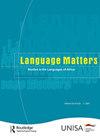Indigenous Languages in an Online Space: Translanguaging for Visibilisation of Multilingualism and Multisemiotic Modes
IF 0.8
3区 文学
0 LANGUAGE & LINGUISTICS
引用次数: 0
Abstract
Abstract Drawing on the notion of translanguaging, we show how Facebook actors enact and sustain the use of a variety of Zambia’s indigenous languages alongside the English language. We conceive of Facebook as an online semiotic/linguistic landscape that occasions opportunities for language display through status updates and subsequent comments that draw on English and selected Zambian indigenous languages (Tonga, Bemba, and Nyanja) in the most unpredictable ways. Thus, we argue that translanguaging privileges the visibilisation of multilingualism and multisemiotic modes which help bring to the fore the multiple multilingual identities acted out by the social actors in the process of meaning-making. We argue that translanguaging as a language practice broadens the semiotic resources from which online actors draw without regard for watchful adherence to the socially and politically defined boundaries of the named languages. We insist that meaning on Facebook should be seen from individual positionality anchored on the linguistic freedoms, which eventually enable the social actors to deploy a range of multisemiotic modes.网络空间中的土著语言:多语言和多文化模式的翻译
摘要:在翻译的概念上,我们展示了Facebook演员如何制定和维持使用各种赞比亚土著语言和英语。我们认为Facebook是一个在线的符码/语言景观,通过状态更新和随后的评论,以最不可预测的方式利用英语和赞比亚本土语言(汤加语、本巴语和尼扬贾语),提供语言展示的机会。因此,我们认为,翻译的特权是多语言和多符号学模式的可见性,这有助于突出社会行为者在意义制造过程中所表现出的多种多语言身份。我们认为,作为一种语言实践,翻译拓宽了网络行动者从中汲取的符号学资源,而无需注意遵守命名语言的社会和政治定义的边界。我们坚持认为,应该从基于语言自由的个人定位来看待Facebook上的意义,这最终使社会行动者能够部署一系列多符号学模式。
本文章由计算机程序翻译,如有差异,请以英文原文为准。
求助全文
约1分钟内获得全文
求助全文
来源期刊

Language Matters
Multiple-
CiteScore
1.20
自引率
0.00%
发文量
19
期刊介绍:
The purpose of Language Matters is to provide a journal of international standing with a unique African flavour focusing on multilingualism in Africa. Although the journal contributes to the language debate on all African languages, sub-Saharan Africa and issues related to multilingualism in the southern African context are the journal’s specific domains. The journal seeks to promote the dissemination of ideas, points of view, teaching strategies and research on different aspects of African languages, providing a forum for discussion on the whole spectrum of language usage and debate in Africa. The journal endorses a multidisciplinary approach to the study of language and welcomes contributions not only from sociolinguists, psycholinguists and the like, but also from educationalists, language practitioners, computer analysts, engineers or scholars with a genuine interest in and contribution to the study of language. All contributions are critically reviewed by at least two referees. Although the general focus remains on multilingualism and related issues, one of the three issues of Language Matters published each year is a special thematic edition on Language Politics in Africa. These special issues embrace a wide spectrum of language matters of current relevance in Southern Africa.
 求助内容:
求助内容: 应助结果提醒方式:
应助结果提醒方式:


